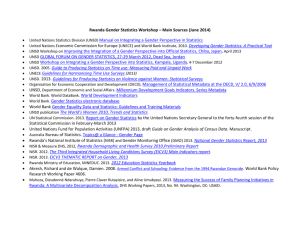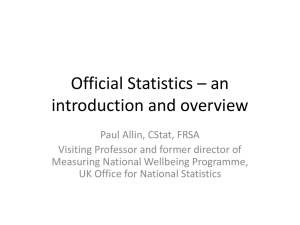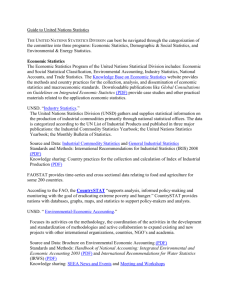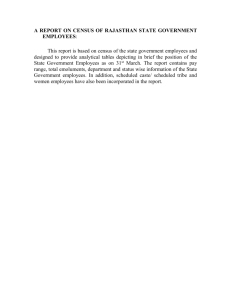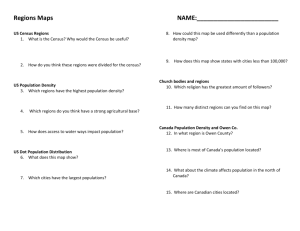Session 3 – Country Presentations - United Nations Statistics Division
advertisement
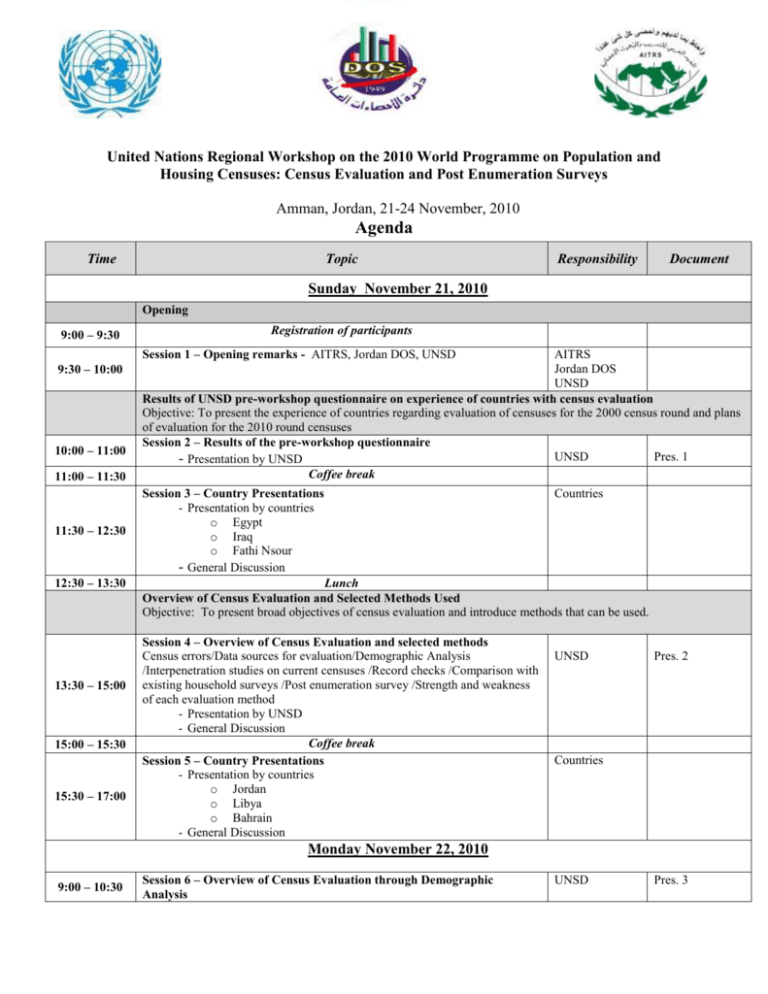
United Nations Regional Workshop on the 2010 World Programme on Population and Housing Censuses: Census Evaluation and Post Enumeration Surveys Amman, Jordan, 21-24 November, 2010 Agenda Time Topic Responsibility Document Sunday November 21, 2010 Opening 9:00 – 9:30 Registration of participants Session 1 – Opening remarks - AITRS, Jordan DOS, UNSD 9:30 – 10:00 10:00 – 11:00 11:00 – 11:30 11:30 – 12:30 12:30 – 13:30 13:30 – 15:00 15:00 – 15:30 15:30 – 17:00 AITRS Jordan DOS UNSD Results of UNSD pre-workshop questionnaire on experience of countries with census evaluation Objective: To present the experience of countries regarding evaluation of censuses for the 2000 census round and plans of evaluation for the 2010 round censuses Session 2 – Results of the pre-workshop questionnaire UNSD Pres. 1 - Presentation by UNSD Coffee break Session 3 – Country Presentations - Presentation by countries o Egypt o Iraq o Fathi Nsour - General Discussion Countries Lunch Overview of Census Evaluation and Selected Methods Used Objective: To present broad objectives of census evaluation and introduce methods that can be used. Session 4 – Overview of Census Evaluation and selected methods Census errors/Data sources for evaluation/Demographic Analysis /Interpenetration studies on current censuses /Record checks /Comparison with existing household surveys /Post enumeration survey /Strength and weakness of each evaluation method - Presentation by UNSD - General Discussion Coffee break Session 5 – Country Presentations - Presentation by countries o Jordan o Libya o Bahrain - General Discussion UNSD Pres. 2 Countries Monday November 22, 2010 9:00 – 10:30 Session 6 – Overview of Census Evaluation through Demographic Analysis UNSD Pres. 3 Time 10:30 – 11:00 11:00 – 12:30 12:30 – 13:30 13:30 –15:00 15:00 – 15:30 15:30 – 17:00 Topic Responsibility Document Direct comparisons with data from external sources/methods based upon comparison with theoretical distributions/methods based upon comparison with a previous census Coffee break Countries Session 7 – Country Presentations - Presentation by countries o Morocco o Yemen o Saudi Arabia - General Discussion Lunch Post-Enumeration Survey – Requirements, Planning, Designing and Executing Objective: To present an overview of the essential requirements for Post Enumeration Surveys, the designing and planning and its importance to successful execution of the PES UNSD Pres. 4 Session 8 – Post-Enumeration Survey – Requirements, Planning, Designing and Executing /Requisite qualities of PES/Costs /Other resources /Organization structure /Technical planning /Development of Questionnaire and field manuals/Budgeting/ Pilot test /Selection and training of field staff /Publicity/Field data collection - Presentation by UNSD - General Discussion Coffee break UNSD Pres. 5 Session 9 – Sampling frames and sample design Description of frames /Stratification /Sample design and selection /Significance of adequate sample sizes in various domains. - Presentation by UNSD - General Discussion Tuesday November 23, 2010 09:00 – 10:30 10:30 – 11:00 Countries Session 10 - Country Presentations - Presentation by countries o Palestine o Mauritania o Lebanon - General Discussion Coffee break Evaluation of Census Coverage Objective: To present methodologies for evaluating census coverage 11:00 – 12:30 Session 11 - Methodologies and procedures for evaluating coverage and content error P-sample/E-sample/Two-way-matching/Procedures A, B and C. - Presentation by UNSD - General Discussion 12:30 – 13:30 Lunch Session 12- Country Presentations - Presentation by countries o Syria o Tunisia o Sudan o Kuwait 13:30 – 15:00 UNSD Countries 2 Pres. 6 Time Topic Responsibility Document - General Discussion 15:00 – 15:30 15:30 – 16:00 16:00 – 17:00 Coffee break Session 13 – Matching Steps followed in matching /Computer assisted matching /Manual matching /Matching rules /Matching process /Role of field reconciliation - Presentation by UNSD - General Discussion Session 14 - Treatment of missing data Why missing data? /Weighting for compensating missing data. Imputing for missing data What are the reasons for imputing missing data? /What is involved in weighting and imputing data? - Presentation by UNSD - General Discussion UNSD Pres. 7 UNSD Pres. 8 Session 15 – Estimation of Coverage Errors Coverage error estimate/sampling error/Coverage rate/Erroneous inclusions and its rate /The conceptual framework of the DSE including requirement of independence/ Estimating True population/Census population estimate/PES population estimate/Estimate of census omission rate - Presentation by UNSD - General Discussion Coffee Break UNSD Pres. 9 Session 16 – Estimation of Content Errors Content error estimates /Index of inconsistency /Aggregate index of inconsistency /Gross difference rate /Rate of Agreement - Presentation by UNSD - General Discussion UNSD Pres. 10 UNSD Pres. 11 UNSD Pres. 12 UNSD Rapporteurs Final Conclusions and Recommendations Wednesday 24, 2010 9:00 – 10:30 10:30 – 11:00 11:00 – 12:30 12:30 – 13:30 13:30 – 14:15 14:15 – 15:00 15:00 – 15:30 15:30– 16:30 Lunch Session 17 – Concept of Independence in Dual System Estimation (DSE) Dual System Estimation methodology assumes independence between P- and E- samples. Hence, it works only if the two samples are independent. - Presentation by UNSD - General Discussion Session 18 – Adjusting census figures Political consideration /statistical consideration /highlights of PES /Country Presentations on adjusting census figures /Circumstances under which respective countries can be advised to adjust census data based on PES results /Discuss how one would adjust the census results based on PES results /Reluctance or ambivalence to adjust census data by some countries /Challenges pertaining to the conduct of a PES - reasons and possible solutions - Presentation by UNSD - General Discussion Coffee break Session 19 - Final report, recommendations & conclusions Review and adopt final report, conclusions and recommendations - Presentation by UNSD - Evaluation of Workshop 3
